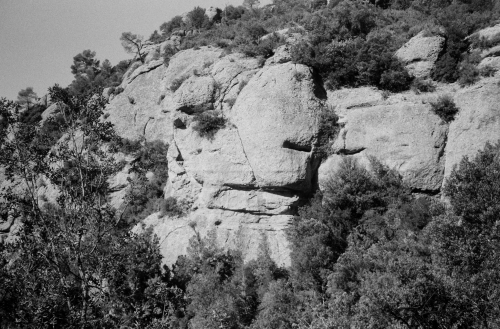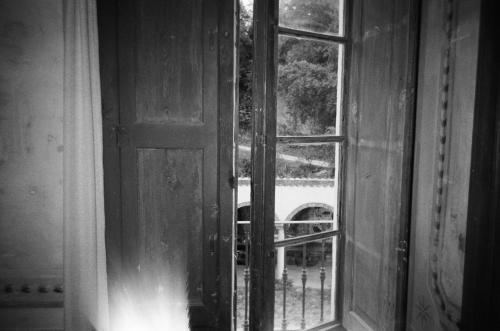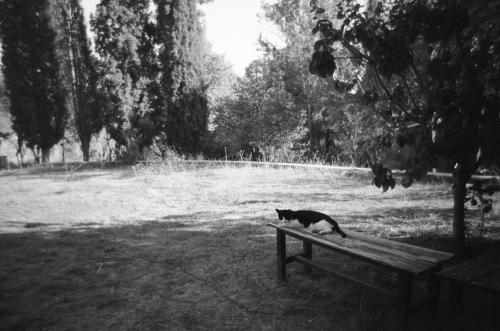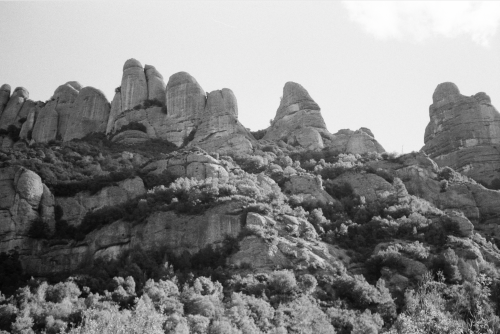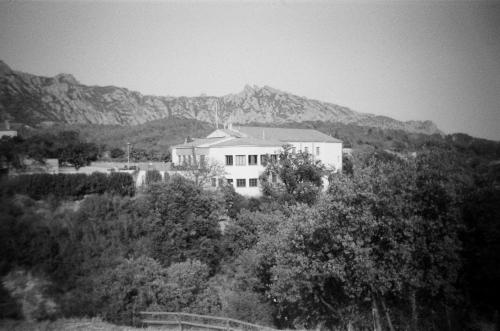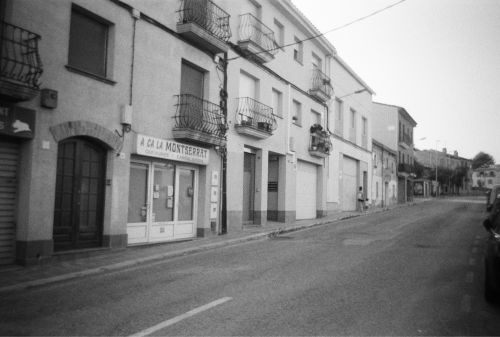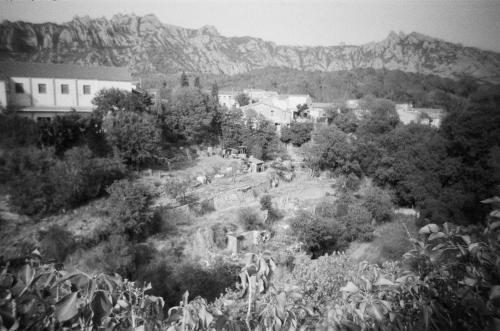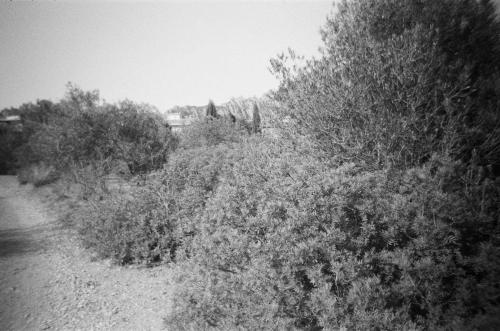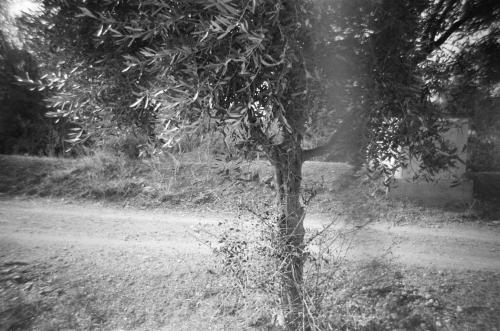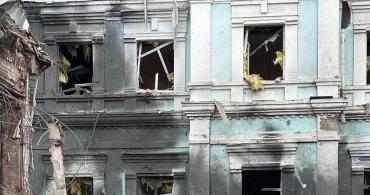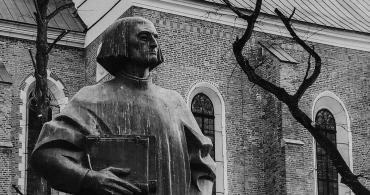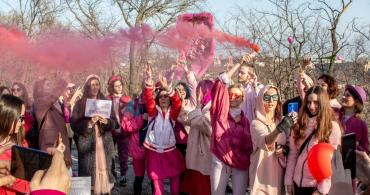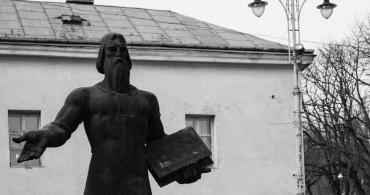The Wave Carries Me Back
31 january, 2024
The Can Serrat residency for writers and artists, to which I was invited as an Artist at Risk program participant, is located near the Montserrat National Park in El Bruc, Catalonia. The end of May to mid-September is wildfire season here. I arrived at the end of August 2023.
The house where the residency is located was built in the 1980s by the artists, and since 1989, it has been hosting them, as well as writers, so they could develop their projects. It is the oldest international residency in Catalonia. Tucked away in a gorge, the house is close to olive groves, trails where goats and sheep roam, and a tourist road leading to Mount Montserrat. Every morning, helicopters flew overhead to monitor the fires, and as I gazed at the beauty around me, I reminded myself that a military plane does not sound like that. Over time, I began to notice more details in the landscape: the leaves that had already turned yellow in August, the dry ground, and the birds and animals exhausted by the heat. There was pain in one of the most beautiful natural landscapes, which sometimes reminded me of Crimea.
Mount Montserrat, whose name translates as a “jagged mountain” (but to me, it seemed more like “wave mountain”), is a symbol of the region. It is praised in songs, known and admired by almost every Catalan, and according to legends, angels used golden saws to shape its peak into this shape. The massif of the mountain stretches for 10 km, and the peak point, Sant Jeroni, reaches 1236 meters. You can get there on foot or by cable railway, and it is also a popular place for rock climbing.
In her essay “The Santa Ana” (1967), Joan Didion writes about the eponymous wind that causes fires and defines life in Los Angeles. Didion defines the weather in the city as “catastrophic weather,” which evokes instability and destruction in people’s imagination of life. And what happens to us as we live amid environmental, humanitarian, and economic disasters and the increasing number of wars? I read Didion’s thoughts with pain and projected them onto my own home, which is constantly being destroyed not by the winds, but by people.
“The war is forever with us,” my friend told me last year when we finally met after a long time of moving back and forth. I did not believe her then. However, the longer I was away from the war-torn home, the more I felt how deeply it was embedded in me. When I woke up in the morning, I would immediately reach for my phone to see what had happened in Ukraine at night. It felt good when there was nothing. Gradually, this impulse began to subside, and I would wake up to admire the sunlight playing on the walls and ceiling of the room.
Having tasted peace, I almost immediately began to long for it. I wanted to stay with it more and more, and I reсollected the days before the war. I started to notice my anxiety and to separate it from myself. It would overflow me like a wave after a sudden rumble, knock, whistle, etc., but I increasingly learned to emerge from it quite quickly. To get rid of the anxiety, I went for a lot of walks.
Having tasted peace, I almost immediately began to long for it. I wanted to stay with it more and more, and I reсollected the days before the war. I started to notice my anxiety and to separate it from myself. It would overflow me like a wave after a sudden rumble, knock, whistle, etc., but I increasingly learned to emerge from it quite quickly. To get rid of the anxiety, I went for a lot of walks.
My walks, my desire to separate myself, to be alone, led me to the bed of a dried-up river that once flowed past El Bruc. I was told that ten years ago, it used to flow here, and the locals remember and miss it. I started longing for the happy days, for looking into the distance, for projects, suspended because of the war. And for those friends and colleagues, who were alive a month or a year ago. I began to forget what my family and I were like in 2012-2013 before the war broke out. Today, grass, flowers, and trees have grown on the site of the river, and in some places, people have set up plots.
At the residency, I met people who asked me about Ukraine and sympathized with me because of what Russia was doing to it. Some of them talked about their losses, pain, and places they will never return to. One resident told me about how they had evacuated their home during a wildfire, and upon their return, it had already burned down. The Montserrat reminded them of the mountains they grew up among – tall, bare, sharp.
The helicopters stopped monitoring the forests of the National Park in mid-September. I stayed in residency for a little over a month after that. The war between Israel and Gaza broke out, and there were more people among the residents who spent almost all their time on their phones and laptops reading the news. I continued to join volunteer fundraisers for new equipment and medicines for the Armed Forces of Ukraine.
The helicopters stopped monitoring the forests of the National Park in mid-September. I stayed in residency for a little over a month after that. The war between Israel and Gaza broke out, and there were more people among the residents who spent almost all their time on their phones and laptops reading the news. I continued to join volunteer fundraisers for new equipment and medicines for the Armed Forces of Ukraine.
Pain, grief, and sadness are with us all the time, and I have never felt it as intensely as I do now. And I have never noticed so many people going through grief. The wave carried me to that shore, and I hope someday it will bring me back.
I wrote this text thinking of the philosopher Yevhen Hulevych, who died near Bakhmut on January 31, 2022, and the poet Maksym Kryvtsov, who died on the Kharkiv front on January 7, 2024.
I wrote this text thinking of the philosopher Yevhen Hulevych, who died near Bakhmut on January 31, 2022, and the poet Maksym Kryvtsov, who died on the Kharkiv front on January 7, 2024.
To read more articles about contemporary art please support Artslooker on Patreon
Share:
